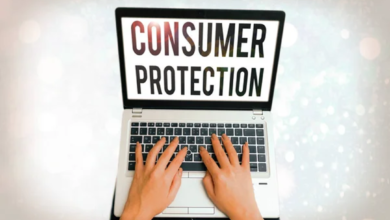2024 Consumer Protection Updates: What Businesses Must Comply With
2024 consumer protection updates: Learn what businesses must comply with to stay ahead of new regulations in data privacy and advertising.

Laws pertaining to consumer protection are changing quickly, and this is also the case with the 2024 updates. Complying with the new standards is more important than ever for businesses to manage. The aforementioned revisions are intended to improve consumer rights, promote openness, and guarantee that companies are held responsible for their actions. Maintaining customer trust and avoiding legal ramifications require understanding these changes.
Data privacy, product safety, and truthful advertising are at the forefront of developments in an increasingly digital society. The new rules provide more stringent guidelines on how companies must handle customer data, guarantee the safety of their products, and interact with clients. By taking proactive measures in these areas, companies can improve their reputation and customer loyalty in addition to adhering to the law.
2024 Consumer Protection Updates
Understanding Consumer Protection
The term “consumer protection” refers to a body of laws and rules intended to guarantee that customers’ rights are respected and that companies use ethical business practices. The principal objective is to forestall companies from committing fraud or other specific unfair activities in order to outdo rivals or deceive customers.
Key Changes in 2024 Consumer Protection Laws
The 2024 updates to consumer protection laws are extensive, reflecting the changing landscape of consumer rights and business operations. These changes are aimed at enhancing consumer trust and ensuring businesses are accountable for their practices.
Data Privacy and Security
Data privacy continues to be a focal point of consumer protection. In 2024, businesses will face stricter data protection requirements, including more robust protocols for handling data breaches. Companies must ensure they have comprehensive data security measures in place to protect consumer information and comply with the latest regulations.
Product Safety Standards
Product safety standards have been heightened to prevent harm to consumers. Businesses are now required to adhere to more stringent safety regulations and must report any product defects promptly. This not only helps in maintaining consumer trust but also reduces the risk of legal repercussions.
Advertising and Marketing Regulations
Advertising and marketing practices are under greater scrutiny. The new laws emphasize truth in advertising, requiring businesses to be honest and transparent about their products and services. Misleading marketing tactics are now subject to stricter penalties, ensuring that consumers receive accurate information.
Online Consumer Rights
With the surge in e-commerce, consumer rights for online transactions have been strengthened. New protections include clearer return and refund policies, and businesses must ensure these policies are easily accessible to consumers. This change is designed to enhance the consumer experience and build trust in online transactions.
Compliance Strategies for Businesses
Navigating the updated consumer protection laws can be daunting, but with the right strategies, businesses can ensure compliance and avoid penalties.
Conducting a Compliance Audit
A thorough compliance audit is essential to identify any gaps in adherence to the new regulations. This involves reviewing current practices, identifying areas of non-compliance, and implementing necessary changes.
Training and Education for Staff
Educating staff about the importance of consumer protection and the specifics of the new regulations is crucial. Regular training sessions can help ensure that all employees are aware of their roles in maintaining compliance.
Legal Advice and Consultancy
Legal counsel can provide invaluable guidance in navigating complex regulations. Finding the right advisor who understands the nuances of consumer protection laws can help businesses implement effective compliance strategies.
Technology Solutions
Leveraging technology can simplify compliance management. There are numerous software solutions designed to help businesses track regulatory changes, manage compliance requirements, and automate reporting processes.
Developing a Consumer Protection Policy
Creating a robust consumer protection policy is a proactive step towards compliance. This policy should outline the company’s commitment to consumer rights, detail procedures for handling complaints, and specify protocols for ensuring product safety and data security.
Monitoring and Reporting
Regular monitoring of compliance efforts is necessary to ensure ongoing adherence to regulations. Implementing reporting mechanisms for any violations can help address issues promptly and prevent recurrence.
Case Studies of Compliance
Examining case studies can provide valuable insights into the practical application of consumer protection laws.
Success Stories
Success stories of businesses that have effectively implemented compliance measures can serve as inspiration. These cases highlight the benefits of compliance, such as enhanced consumer trust and avoidance of legal issues.
Lessons Learned from Non-Compliance
Conversely, examining cases where businesses failed to comply can offer important lessons. Understanding the repercussions of non-compliance can underscore the importance of adhering to regulations.
Small Business Considerations
Small businesses face unique challenges in complying with consumer protection laws, but there are resources available to assist them.
Specific Challenges Faced by Small Businesses
Resources and Support Available
Various resources, including government programs and industry associations, offer support to small businesses. Utilizing these resources can help smaller enterprises navigate the complexities of consumer protection regulations.
Read More: Recent Changes in Employment Law: What Employers and Employees Should Know
Conclusion
Following the 2024 consumer protection upgrades is not only required by law, but it is also a calculated move for companies looking to build customer loyalty and confidence. These laws are intended to make the market more secure and open, with a particular emphasis on data privacy, product safety, and truthful advertising. Businesses can improve their operational integrity and steer clear of the consequences of non-compliance, such heavy penalties and reputational harm, by carefully comprehending and putting these improvements into practice.
Any company that cherishes its relationship with clients must stay abreast of consumer protection regulations. Businesses have the chance to review their procedures and make sure they comply with the most recent standards by taking advantage of the 2024 changes. Accepting these modifications can assist create a stronger, more reliable brand that customers can rely on in addition to helping you comply with regulatory requirements.
FAQs
What are the penalties for non-compliance?
Penalties for non-compliance can range from fines to legal action and reputational damage. The specific consequences depend on the nature and severity of the violation.
How often should businesses update their compliance practices?
Businesses should regularly review their compliance practices, ideally at least annually, to ensure they are in line with the latest regulations.
What resources are available for understanding new regulations
Resources include government websites, legal advisors, industry associations, and compliance management software that offer guidance and updates on new regulations.
Can small businesses afford compliance measures?
While compliance measures can be costly, the long-term benefits of avoiding penalties and building consumer trust often outweigh the initial expenses. There are also various resources and support systems available to help small businesses manage these costs.
How do consumer protection laws differ internationally?
Consumer protection laws vary by country, with each jurisdiction having its own set of regulations. Businesses operating internationally must be aware of and comply with the consumer protection laws in each country they operate in.











